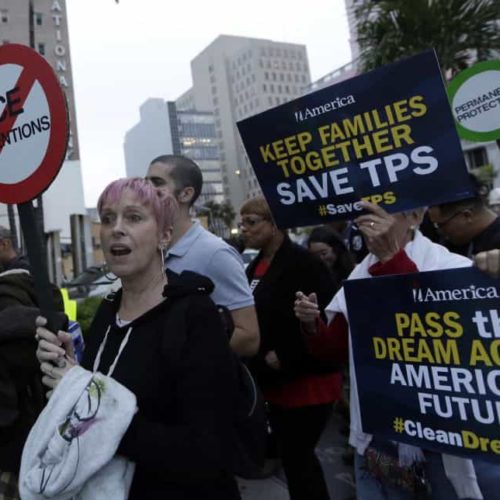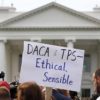Introduction
Shaking up immigrant communities, the Trump Administration announced Friday it is ending Temporary Protected Status for 57,000 Hondurans who’ve been raising families and working legally in the United States for two decades. The immigrants were provided this limited legal status following a 1998 killer hurricane that ravaged the small nation that today is struggling with organized crime and political unrest.
The Hondurans face the prospect of becoming undocumented if they don’t leave the U.S. in 18 months, by Jan. 5, 2020. As a result of the decision, they join the ranks of other immigrants who’ve seen their temporary protected status terminated by the Trump Administration. That group includes 59,000 from Haiti and 200,000 people from El Salvador who also face either uprooting or becoming undocumented this summer or early next year, respectively.
Many of these more than 300,000 immigrants, collectively, have lived here for a good portion of their lives under TPS, as this status is known. Critics of Trump’s move to end TPS—without Congress opening a path for people to try to obtain permanent legal status—say communities should brace for the fallout of shattered families, and losses to businesses that the immigrants work in or operate themselves, as the Center for Public Integrity has reported.
Hundreds of thousands of U.S.-born children stand to lose parents who will have to decide whether to leave them behind in the U.S. or move them back to precarious conditions in their home countries. Haiti is suffering from the after-effects of an earthquake, and both Honduras and El Salvador have been reeling from rampant gang-related violence. As many immigrants have admitted, they also must decide whether to attempt to remain in the U.S. as undocumented immigrants for as long as they can manage—if they can’t find a way to obtain legal status, which is unlikely for the majority under the current immigration system.
A wide range of civil rights, religious and business associations, including the Chamber of Commerce, have spoken out against revoking TPS for so many people from dangerous, dysfunctional and impoverished countries.
Congress created TPS in 1990 as a way to provide refuge to foreigners in the U.S. if a natural disaster or political or social upheaval created conditions that are too dangerous or difficult for the foreigners to safely return.
In a Friday announcement, the Department of Homeland Security said that DHS Secretary Kirstjen Nielsen has determined that “the disruption of living conditions” caused by the hurricane that struck Honduras in 1998 “should no longer be regarded as substantial.” Thus, Nielsen reasoned in a narrow interpretation of TPS, the protection for Hondurans here should be terminated. Other administrations have reasoned that living conditions were still too precarious to accommodate the return of so many people, and that it was in the U.S. interest to allow people to remain.
The Haitians who’ve had TPS since 2010—following that massive earthquake that year —will lose their status on July 22 of this year. The Salvadorans received TPS in 2001 following a massive earthquake that struck that country. Many Salvadorans were already here, undocumented, at that time after the leaving the chaos of a nation consumed by civil war in the 1980s and early 1990s. The Salvadorans will lose their TPS as of Sept. 9, 2019.
Also facing future potential deportation are 9,000 Nepalis, who were provided TPS after a 2015 earthquake and lose it June 24, 2019, and 5,300 Nicaraguans, who were provided TPS in 1999 after the same hurricane that struck Honduras. The Nicaraguans lose TPS on Jan. 5, 2019.
In November 2017, a Honduran woman in the Washington, D.C. area—which has a large concentration of Hondurans with TPS—spoke with the Center for Public Integrity when it became evident that the new Trump Administration was considering pulling the plug on TPS.
“I’m so nervous I can’t even think about what I would do if I lose TPS,” the woman said, asking for her name not to be revealed. For 13 years, she said in 2017, she had cleaned a U.S. government building, a job requiring a special ID, from 7:30 a.m. to 4 p.m. After that shift, she cleaned a private building from 5 p.m. to 9 p.m.
Days before the decision, Honduran TPS recipient Orlando Lopez, expressed anxiety. All TPS recipients have to register and go through background checks, and are disqualified if they have criminal records. “We work hard and do not have criminal records,” he said in a call with reporters. “I own a home and business with my family and every year I pay my taxes.”
Emeryville, Calif., Mayor John Bauters, told reporters: “Strangers, families and friends would have to piece together their (the TPS immigrants’) lives after this decision is made. There isn’t anything worse that we could do right now than remove a massive amount of people who are integral to the American economy and whose family ties and lives are connected primarily to the United States.”
The Department of Homeland Security’s Friday announcement said that the decision to terminate TPS for Hondurans in 18 months is designed to “allow for an orderly transition,” and to provide time for the Hondurans to seek alternative lawful immigration status if they are eligible.
In reality, though, options to seek legal status are very limited for TPS holders. Most do not have a close family member who can sponsor them. Most employers have no access to visas to try to sponsor them. If they can afford the expense, they can attempt to seek relief through immigration court, with uncertain outcomes. Many immigrant rights advocates are urging Congress to act by approving a path that would allow TPS holders to seek permanent immigrant status.
Read more in Inequality, Opportunity and Poverty
Immigration Decoded
Commentary: Trump’s immigration blame game
Migrants have long assumed costs, risks of border crossing—but Trump’s finger pointing now adds to the burden.
Immigration Decoded
ICE failed to penalize contract immigrant jails with thousands of safety and rights violations
Federal watchdog says contractors failed to report sexual assaults and staff misconduct to ICE investigators.





Join the conversation
Show Comments